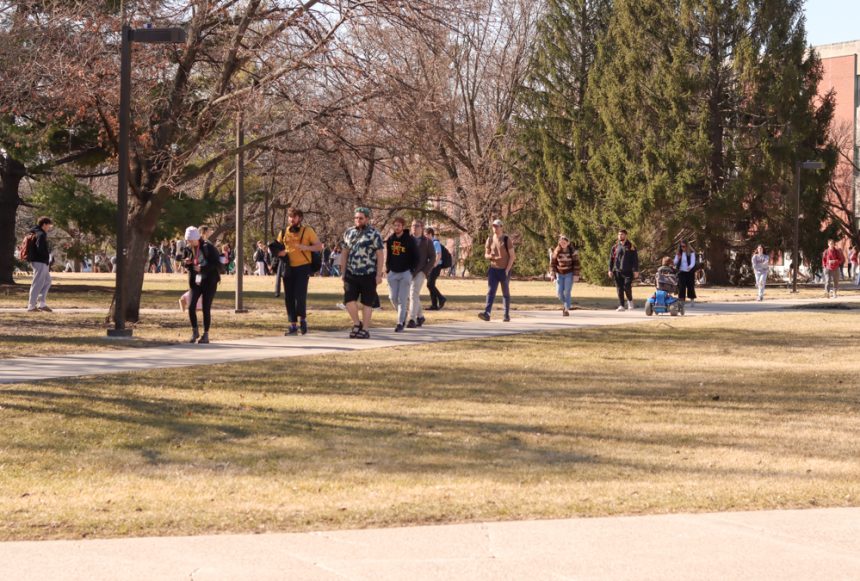A coalition of faculty and student groups at Iowa’s public universities have spoken out against calls to join a new higher education compact. (Photo by Cami Koons/Iowa Capital Dispatch)
A group representing faculty at each of Iowa’s public universities is speaking out against the higher education compact developed by President Donald Trump and his administration and touted as a great opportunity by Iowa lawmakers.
The Iowa Higher Education Coalition sent a press release Wednesday in which it “rejects” calls from Rep. Taylor Collins and Sen. Lynn Evans for the Iowa Board of Regents to sign on to the Excellence in Higher Education Compact, which would have universities freeze tuition, limit international student enrollment and more.
Represented by the coalition are organizations including University of Northern Iowa faculty union United Faculty, Campaign to Organize Graduate Students at the University of Iowa, American Association of University Professors at the UI and Iowa State University and the Iowa Federation of Labor.
“The compact would subject our Iowa-operated public universities to extortion, based on demonstrating partisan loyalty to the federal government,” said United Faculty President Christopher Martin in the release. “Iowans would lose control of the universities. That’s a terrible deal for Iowa taxpayers.”
SUBSCRIBE: GET THE MORNING HEADLINES DELIVERED TO YOUR INBOX
Universities would need to follow policies relating to admission and hiring, academic freedom, information on finances and institutional neutrality. Tuition would also freeze for five years. Those who do not enter into the compact possibly risk federal funding.
The compact’s vagueness on requiring a variety of viewpoints at all levels of campus community and use of language like “neutrality” and “excellence” is part of “an attempt to assert federal control over universities,” said United Faculty Vice President Fernando Calderón in the release.
Financial consequences of signing on to the compact could also be dire, the release stated, especially as state funding could remain flat in the upcoming fiscal year.
Tuition is the largest revenue source for Iowa universities and state funding makes up less than one-third of total revenues, and the release cited a Postsecondary Education & Economics Research Center paper that stated net costs for students and families have increased as a result of tuition freezes in other states.
The U.S. Department of Justice will be in charge of reviewing universities for compliance with the compact and will have those who have violated it forfeit federal funding and other “benefits” from the federal government for at least one year, according to the compact. The opponents’ release stated this would create even more financial uncertainty.
“The compact weaponizes public funding to compel ideological obedience. It transforms education from a public good into a conditional privilege granted only to institutions willing to align with state-sanctioned norms,” Calderón said in the release.
Protections for freedom of speech and “civil discourse in the classroom” are already set in place in Iowa Board of Regents policy and state code, the release stated, that provide guidance for how professors handle potentially controversial matters and ensure individuals can share their thoughts and ideas.
“We all want Iowa’s public universities to be places where students and faculty — regardless of political orientation — are not just free but encouraged to pursue their own intellectual discovery and to contribute to a campus culture devoted to excellence, curiosity and tolerance,” said Cullen Padgett-Walsh, president of Iowa State University’s AAUP chapter, in the release. “Bullying from the federal government isn’t the way to get there.”









